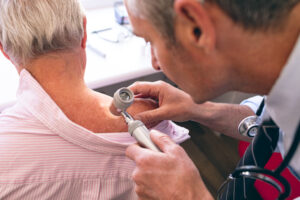Leah Bucholz brings attention to the complex interplay between obstructive sleep apnea and weight gain in veterans disability. What is the connection between these two factors, and how weight gain can be a significant risk factor for the development of OSA, particularly in veterans? Understanding this relationship is crucial, as it can be pivotal in veterans’ disability claims.

The Dynamics of Sleep Apnea
There are different types of sleep apnea, with a focus on obstructive sleep apnea, which involves the obstruction of the upper airway. This obstruction can result from various factors, including hypotonia of the upper airway or the collapse of excess body tissue. But we need to note the multifactorial nature of weight gain in veterans, considering factors such as overeating, dietary habits, and service-related issues.
Weight Gain: A Bridge to Service-Connected Disorders
The link between weight gain and service-connected conditions becomes a crucial point of discussion. Weight gain can be a bridge connecting various disorders related to service, such as mental health conditions or physical limitations due to things like orthopedic ailments. Veterans may face challenges like binge eating or reduced exercise capacity, contributing to weight gain and, consequently, the development of obstructive sleep apnea.
VA Regulatory Guidance on Weight-Related Claims
It is crucial to understand the VA regulatory guidance in weight-related disability claims. If weight gain or obesity is a direct result of a service connected condition and is deemed the primary factor leading to a particular condition, it can be linked to that service-connected condition. This necessitates a thorough examination and a determination that the condition would not have occurred without the weight gain.
Supporting Evidence from Research Studies
Various research studies shed light on the intricate relationship between weight gain, physical activity, and chronic diseases. One study emphasizes the lack of exercise as a major cause of chronic diseases, highlighting the need for sufficient daily physical activity. Another study explores the trends of obesity, abdominal obesity, physical activity, and calorie intake, emphasizing the importance of physical activity in weight management.
Debunking Caloric Reduction Myths
There is a common misconception that caloric reduction alone is sufficient for sustained weight loss but frequent exercise is the strongest predictor of weight loss maintenance. This fact counters the notion that diet alone is the key to long-term weight management.
Exploring the Impact of Psychosocial Factors and Medications
There are also psychosocial factors and medications as contributors to weight gain. Stress, as discussed in a study on psychosocial stress and weight gain among US adults, is identified as a potential factor. Additionally medications, especially antidepressants and steroids, may have side effects leading to weight gain.
The Millennium Cohort Study: A Veteran-Centric Perspective
Leah introduces the Millennium Cohort Study, involving over 77,000 veterans and military service members. This study reveals a link between post-traumatic stress disorder (PTSD) and weight gain, underscoring the need to consider mental health conditions in the context of weight-related claims.
Conclusion: A Holistic Approach to Veterans’ Health
In conclusion, Leah Bucholz’s insights highlight the intricate relationship between obstructive sleep apnea, weight gain, and service-connected conditions in veterans. We see the importance of taking a holistic approach to veterans’ health assessments, considering physical, mental, and lifestyle factors in disability claims. As veterans navigate the complexities of obtaining disability benefits, a comprehensive understanding of these interconnections becomes instrumental in ensuring accurate and thorough evaluations.
Also read: Acid Reflux and Gastroesophageal Reflux in Veterans Disability
At Prestige Veteran Medical Consulting, a veteran-owned company, we specialize in Independent Medical Opinions (IMOs) known as Nexus letters.
Our purpose is to empower YOU, the veteran, to take charge of your medical evidence and provide you with valuable educational tools and research to guide you on your journey.
Understanding the unique challenges veterans face, our commitment lies in delivering exceptional service and support.
Leveraging an extensive network of licensed independent medical professionals, all well-versed in the medical professional aspects of the VA claims process, we review the necessary medical evidence to incorporate in our reports related to your VA Disability Claim.
Prestige Veteran Medical Consulting is not a law firm, accredited claims agent, or affiliated with the Veterans Administration or Veterans Services Organizations. However, we are happy to discuss your case with your accredited VA legal professional.













